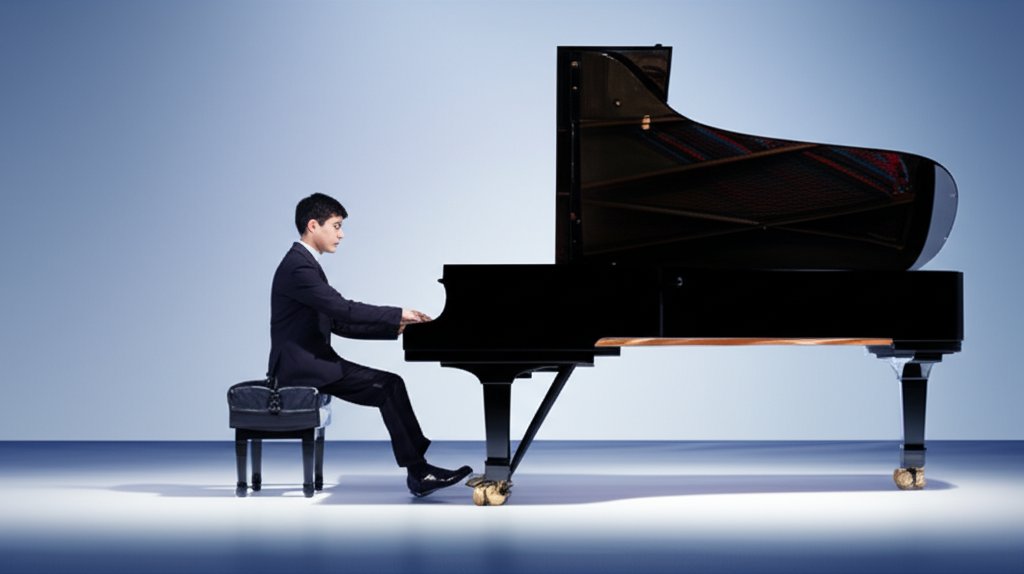The moment before the first note hangs in the air, thick with potential. For a young pianist, that silence is everything—a space carved out by months of practice, focus, and dedication. Entering the world of piano competitions for youth is often the first time they share this intensely personal work on a public stage, transforming solitary effort into a shared artistic experience. It’s a significant step, moving from the practice room to the recital hall, and it offers far more than just a chance to win an award.
This journey is about building resilience, receiving expert feedback, and discovering one’s voice as an artist. It’s a structured path for growth that can define a young musician’s development.
At a Glance: Your Guide to Youth Piano Competitions
- Understand the Why: Discover the core benefits beyond trophies, from building performance stamina to gaining invaluable feedback from seasoned adjudicators.
- Match the Musician to the Mission: Learn to distinguish between different competition formats—like concerto opportunities versus solo repertoire showcases—to find the perfect fit.
- Master the Application: Get a clear breakdown of the modern application process, from selecting a balanced program to creating a high-quality video submission.
- Prepare for Performance: Uncover practical strategies for mental and technical preparation, ensuring you walk on stage (or press record) with confidence.
- Turn Every Outcome into Fuel: Learn how to interpret judges’ comments and use the entire experience, win or lose, as a springboard for future growth.
Beyond the Trophy: What Do Young Pianists Really Gain?
While the allure of a cash prize or a prestigious title is strong, the true value of piano competitions for youth lies in the process itself. These events are powerful educational tools that build skills extending far beyond the keyboard.
First and foremost, competitions provide a concrete goal with a firm deadline. This structure motivates students to polish their pieces to a performance-ready level, a standard often higher than that for a regular studio recital. The act of preparing three to five contrasting pieces, as required by many events, also helps build a solid, versatile repertoire.
Moreover, performing under pressure is a skill in itself. A competition setting simulates the professional environment that aspiring musicians will one day face. Learning to manage nerves, focus intently, and communicate musically despite the adrenaline is a lesson no practice room can fully teach. Finally, the feedback is invaluable. Adjudicators provide written comments that offer an objective, expert perspective on a student’s playing, highlighting strengths and pinpointing specific areas for improvement. This feedback is a roadmap for the next phase of their musical education.
Decoding the Landscape: Finding the Right Competition for You

The world of youth piano competitions is vast and varied. The key is finding an event that aligns with the student’s current skill level, artistic goals, and temperament. While a comprehensive search can help you Discover piano competitions locally and online, the next step is to analyze the specific types of opportunities available.
The Concerto Showcase vs. The Solo Recital
Not all competitions test the same skills. Some are designed to find the next great soloist to feature with an orchestra, while others focus on the breadth and depth of a pianist’s solo work.
A prime example of the former is the California Youth Symphony (CYS) Young Artist Competition. This event is for instrumentalists under 19, and the ultimate prize isn’t just a check—it’s the opportunity to perform a full concerto with the CYS orchestra. The focus here is on collaboration, projection, and the stamina to lead an ensemble. It’s a high-stakes, high-reward opportunity for a mature young artist.
In contrast, the Henry and Carol Zeiter Piano Competition at the University of the Pacific centers on solo repertoire. Contestants must prepare works from three of five distinct stylistic periods (Baroque, Classical, Romantic, Impressionist, and Contemporary). This format tests a musician’s versatility, historical knowledge, and ability to craft a compelling, multi-faceted program. The prizes are cash awards, including a special $300 prize for the best performance of a work by an underrepresented composer, reflecting a modern focus on diverse programming.
| Feature | Concerto Competition (e.g., CYS) | Solo Recital Competition (e.g., Zeiter) |
|---|---|---|
| Primary Goal | Select a soloist to perform with an orchestra. | Identify the strongest solo performer. |
| Repertoire | One complete concerto movement or full concerto. | Multiple solo works from various style periods. |
| Skills Tested | Projection, collaboration, stamina, stage presence. | Versatility, stylistic interpretation, programming. |
| Typical Prize | Performance opportunity with an ensemble. | Cash awards, scholarships, recital opportunities. |
The Rise of the Virtual Stage: Online and Video Submissions
The digital era has opened new doors for competitors. Many events, like the Bay Area Piano Holiday Competition, now operate entirely through video submissions. This format has significant advantages, especially for students who live far from competition hubs or who find the pressure of a live, one-shot audition daunting.
Pros of Video Competitions:
- Accessibility: Participate from anywhere in the world.
- Cost-Effective: No travel or accommodation expenses.
- Reduced Pressure: Allows for multiple takes to submit the best possible performance.
Cons of Video Competitions: - Technical Hurdles: Requires access to good recording equipment and knowledge of how to produce a quality video.
- Lack of Ambiance: Misses the energy and acoustic feedback of a live performance hall.
- Impersonal Feedback: Adjudication is based solely on the recording, without the nuance of a live interaction.
For many young pianists, a video competition can be an excellent entry point, offering a lower-stakes way to get feedback and build confidence before tackling a live event.
Is It the Right Fit? Gauging Prestige, Repertoire, and Age Limits
Before committing to an application, read the rules with a fine-tooth comb.
- Age and Location: Ensure the student meets the eligibility criteria. CYS is for those under 19; the Zeiter Competition is for California high school students.
- Repertoire Requirements: This is non-negotiable. The Zeiter Competition’s rule requiring a piece from the Baroque or Classical period is common; it ensures contestants demonstrate a mastery of foundational styles. Don’t prepare a brilliant all-Romantic program if the rules demand otherwise.
- Level: Is this a local, state, regional, or international event? It’s often wise to build experience at the local and state level before aiming for more competitive national or international stages.
Your Competition Playbook: From Application to Performance

Success in piano competitions for youth is a marathon, not a sprint. A methodical approach to preparation can make all the difference.
Step 1: Strategic Repertoire Selection
Choosing what to play is the most critical decision. This choice should be a collaboration between the student, teacher, and parents.
- Showcase Strengths: Select pieces that highlight what the pianist does best. If they have a powerful, virtuosic technique, a Liszt etude might be perfect. If their strength is lyrical phrasing, a Chopin nocturne or a Debussy prelude could be a better choice.
- Meet the Requirements: Double-check that your program satisfies every rule. As seen with the Zeiter competition, this often means creating a balanced “menu” of styles.
- Tell a Story: The pieces should work together as a cohesive program. Think about how they contrast in tempo, mood, and key.
- Consider Unique Angles: The Zeiter competition’s special prize for an underrepresented composer is a clear signal from the judges. Programming a compelling work by Florence Price or Samuel Coleridge-Taylor could be a strategic move that helps a performer stand out.
Step 2: Nailing the Application and Recording
The administrative details are just as important as the musical ones.
- Mind the Deadlines: Mark submission dates clearly on a calendar. The Zeiter competition and Bay Area Holiday Competition both share a December 12, 2025, deadline. Late applications are almost never accepted.
- Budget for Fees: Application fees are standard. Both the CYS and Zeiter competitions cite a $90 fee. Plan for this expense.
- Perfect the Video Submission: If a video is required, treat the recording session like a final performance.
- Audio is King: Use a high-quality external microphone. The built-in mic on a phone or camera will not capture the piano’s true dynamic range.
- Framing Matters: The judges need to see the performer’s face, hands, and posture. A side profile shot is usually best.
- One Continuous Take: Most competitions require each piece to be a single, unedited take to simulate a live performance.
- Check the Rules: Follow all instructions regarding slate (stating your name and piece) and file format.
Step 3: The Art of Preparation and Mock Performances
The months leading up to the competition should be structured and intentional.
- Slow, Deliberate Practice: Secure the technical foundation of each piece long before the deadline.
- Memorization: Solidify memory by practicing in different ways—starting from random points, playing with eyes closed, and visualizing the score.
- Simulate the Stage: The most important step is to perform the full program for others, multiple times. Arrange “mock competitions” with family, friends, or fellow students. This builds stamina and reveals how nerves might affect memory and execution. Dress the part and treat these run-throughs as the real thing.
Quick Answers to Common Questions
Navigating the world of youth piano competitions can bring up a lot of questions. Here are a few common ones.
How do I know if my child is ready for a piano competition?
A student is likely ready when they possess three things: a genuine desire to participate (not just pressure from others), a small set of polished, performance-ready pieces, and the emotional maturity to handle both constructive criticism and potential disappointment. The teacher’s assessment is crucial here.
What do judges really listen for?
Beyond correct notes and rhythms, judges are looking for a mature and compelling musical performance. Key elements include:
- Technical Command: Effortless and reliable execution.
- Musicality: Beautiful tone, thoughtful phrasing, and a clear understanding of the piece’s emotional arc.
- Stylistic Accuracy: Demonstrating an understanding of the performance practices of the Baroque, Classical, or Romantic eras.
- Stage Presence: Confidence, poise, and the ability to connect with the music and (in a live setting) the audience.
Is it better to play a perfect simple piece or an imperfect difficult one?
Almost universally, judges prefer a polished, musically rendered performance of a slightly easier piece over a sloppy, insecure performance of a highly virtuosic one. The goal is to present your best self. Choose repertoire that is challenging but comfortably within your technical grasp, allowing you to focus on making music, not just hitting the notes.
What if I don’t win? How do I handle disappointment?
Reframe the goal. The objective is not to win, but to perform your best and learn from the experience. After the event, sit down with the judges’ comment sheets and your teacher. Identify the recurring themes—was there feedback about rhythmic precision? Dynamic contrast? Use that information to set new, specific goals for the practice room. Every competition is a data point on a long journey of artistic growth.
A Parent’s and Teacher’s Guide to Supportive Coaching
The roles of the parent and teacher are to be the support system, not the source of pressure. The focus should always remain on the student’s personal growth and love for music.
- Focus on the Process: Celebrate the hard work, the discipline of daily practice, and the courage it takes to perform. Praise effort over results.
- Manage Expectations: Help the student understand that the outcome is subjective and that the panel of judges on a different day might have chosen different winners.
- Be the Logistical Manager: Parents can take the lead on managing application deadlines, scheduling recording sessions, and handling travel plans, freeing the student and teacher to focus on the music.
- Listen: After the competition, let the student lead the conversation. Give them space to process their feelings—whether it’s elation or disappointment—before jumping in with analysis.
The most successful competition experiences are those where the student feels unconditionally supported, allowing them to take healthy artistic risks on stage.
Your first step doesn’t have to be signing up for a major national event. The journey into the world of piano competitions for youth can begin small. Start by having a conversation with your teacher about your goals. Research a few local competitions to understand their requirements and listen to past winners online. The goal is to find an opportunity that feels like an exciting challenge, not an overwhelming burden. By preparing with intention and focusing on personal artistry, you transform a competition from a simple contest into a powerful catalyst for growth.
- Discover Affordable Singing Lessons Near Me to Unlock Your Potential - February 24, 2026
- Affordable Vocal Lessons Bring Professional Singing Guidance Within Reach - February 23, 2026
- Local Vocal Lessons Offer Expert Guidance for Every Singer - February 22, 2026










